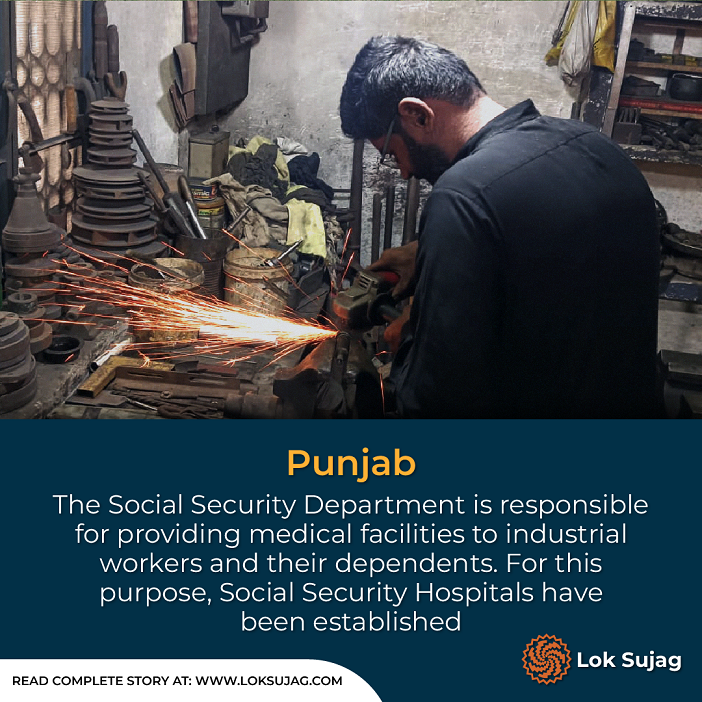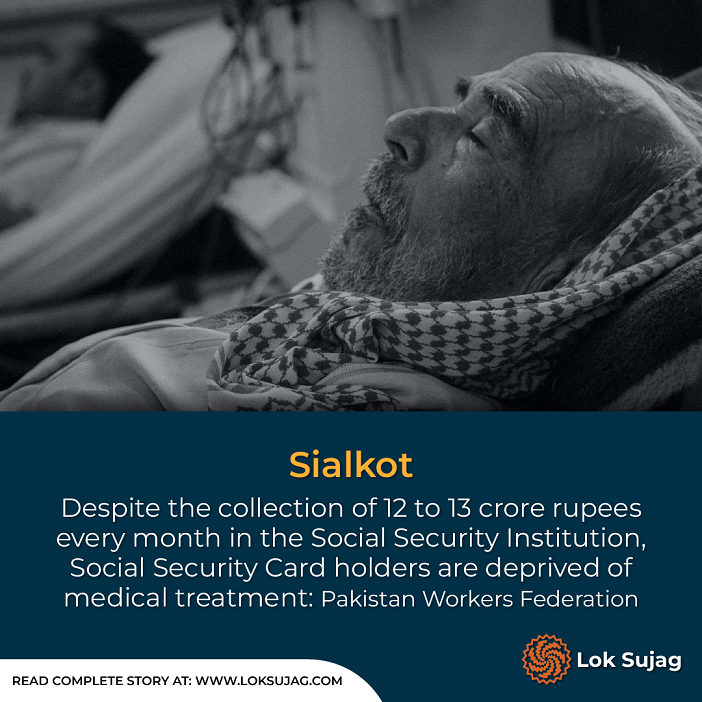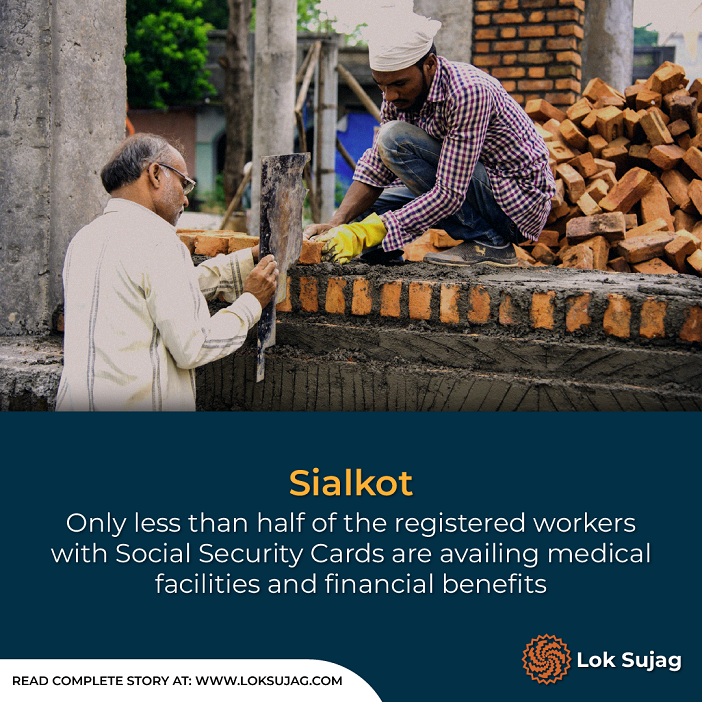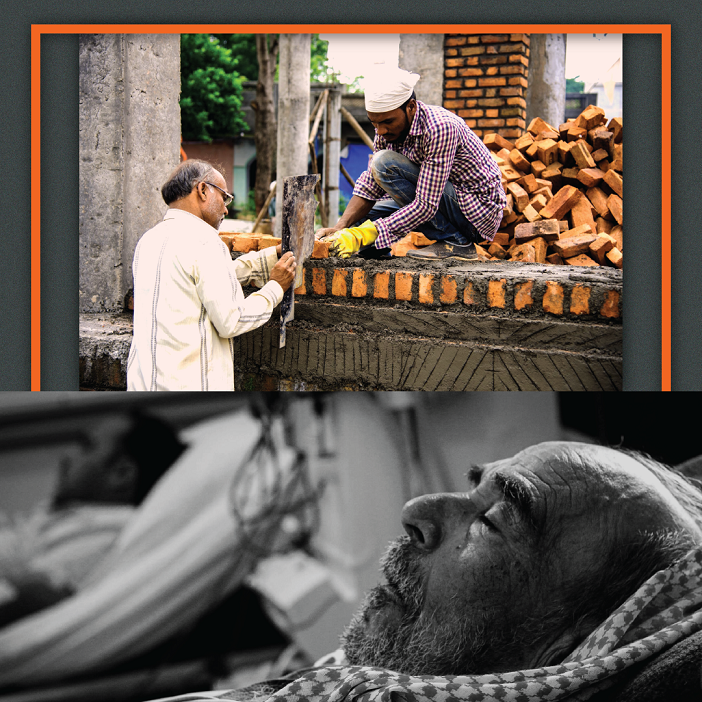Azhar Iqbal used to work in a factory in Sialkot. When he suffered a paralysis stroke a year ago, his wife, Nargis Parveen, took him to the Social Security Hospital established for industrial workers. However, the hospital authorities denied treatment.
Fifty-five years old, Nargis Parveen says that she was compelled to take her husband to a private hospital. He remained in a coma for six days there before passing away.
“In the civil hospital, my husband did not receive appropriate medical facilities. If he had been treated at the Social Security Hospital, perhaps he would be alive today.”
Azhar Iqbal was born in the district of Sargodha and grew up there. He found employment 17 years ago at a factory in Sialkot named 'Cap and Touch’, and his family settled there. Now, his widow and five children reside in a rented house in the Muzaffarabad area, paying a monthly rent of 18,000 rupees.
Punjab Employees Social Security Institution (PESSI) operates under the supervision of the Provincial Department of Labour and Human Resources.
This institution is responsible for providing medical facilities to industrial workers and those under their guardianship.
For this purpose, Social Security Hospitals have been established.
Under the Provincial Employees Social Security Ordinance 1965, the employer must submit 6 per cent of his employees’ salary to PESSI. In return, the institution is obligated to provide all kinds of medical facilities to the registered workers.
Azhar Iqbal had been registered with PESSI for many years, and his factory owner regularly paid his share of the money (6 per cent of the wages).

Nargis Parveen says that one of her daughters has reached the age of marriage. It has not even been a year since her husband passed away, and the Social Security card has already been taken back.
“I am a heart and kidney patient. Now, I have to bear the expenses of my treatment, even though I had heard that after the husband's demise, the wife and children of a labourer are entitled to medical facilities in the Social Security Hospital for two years. However, I have been denied.”
Sajida Bibi's husband used to work in a factory named 'Probec.' Two years ago, he suffered severe injuries in a traffic accident. She took him to the Social Security Hospital, but they were denied admission.
“I was not given any reason for them not providing the treatment. Later, someone told me that perhaps they did not have the required medical facilities available.”
She says that her husband passed away at the Civil Hospital four days later. More than 50,000 rupees were spent on medicines and treatment there, but neither the Social Security authorities nor the factory owners provided any assistance.
Fifty-four years old, Sajida Bibi says she is unwell. A few months ago, when she went to the Social Security Hospital for a hernia operation, she was denied treatment, the reason being that “widows and children do not get any medical treatment facility two years after the husband's death.”

Nargis Parveen and Sajida Bibi's stories are not unique; they represent the plight of thousands of industrial workers in Sialkot. First of all, most don’t even have a Social Security card, but even for those who do, most cannot benefit from the available medical facilities.
According to the law, the responsibility of the Social Security Department is to provide free medical treatment to every registered worker in the hospitals and dispensaries under its supervision. If medical facilities are not available here, the department will arrange for the treatment of the worker at other hospitals at its own expense.
It is the responsibility of the same institution to provide financial assistance to the worker injured during duty and to the widow of the worker who lost his life upon the completion of the prescribed mourning period.
In Sialkot, Director Social Security Muhammad Hassan confirms that this institution is responsible for providing medical facilities to every registered worker and their dependents.
Chaudhry Muhammad Ashraf, the President of the Pakistan Workers Federation North Punjab, claims that 12 to 13 crore rupees are collected monthly from Sialkot in Social Security Institution. Despite this, Social Security cardholders are deprived of medical treatment.
He says that in Sialkot, most of the money collected in the name of workers' contributions is spent on department officials' salaries and administrative expenses. Despite the increasing number of workers, Sialkot's only Social Security Hospital, initially comprised of a hundred beds, has now been reduced to 50 beds.

Sialkot is an industrial city where surgical instruments, sports goods, leather products, textiles, and other items are manufactured.
According to the Punjab Bureau of Statistics, there are 3,314 large industrial units in Sialkot, while the Labor Force Survey for the year 21-2020 indicated that the number of workers in this city is more than 13 lakh and 26 thousand.
Among them, 34.2 per cent, four lakh, 628 are associated with factories.
According to Deputy Director Sardar Muhammad Shafiq, there are 66,435 registered workers in Sialkot Social Security.
However, the number of active Social Security cards here is 27,560. This means less than half of the registered workers are availing medical facilities and financial benefits.
“Many employers collect monthly contributions but do not obtain cards for their workers. Some contractors do not even pool in their share, leading to the accumulation of liabilities. Most of the time, district administration assistance is also required for recovery.”
He says that currently in the Sialkot district, there is a challenge in recovering an outstanding amount of one billion and seventy crore rupees from factory owners and brick kiln owners.
However, Chaudhry Ashraf considers both factory owners and the department equally responsible. Employers object, he says, to workers wasting countless hours at Social Security dispensaries and hospitals to treat minor ailments.
While some factory owners do not make cards for their employees due to some arrangements with the department staff.
Also Read

Silent suffering: Human cost of Quetta’s stone-crushing industry
“These factory owners have registered the workers and also deposited the share amount. However, they have not issued or provided cards to the workers because if one worker benefits, all the factory workers may demand cards, which the owners may not accept.”
Labour leaders believe that most workers are unaware of the importance of a social security card. Whenever labour organisations attempt to raise awareness on this issue, factory owners do not allow them to enter the factory because forming trade unions is prohibited in most factories here.
Sialkot Chamber of Commerce and Industry's Senior Vice President Waqar Jahangir does not accept these allegations. He questioned whether all cardholders were receiving medical facilities. And the answer is negative. If everyone has access to facilities, the morale of both factory owners and workers will improve, and they will take an interest in obtaining cards as well.
Industrial unit 'Awan Sports' Chairman Malik Jarar Awan claims that he has provided all facilities, including social security, to all employees in his factory per the law. However, he complains that the government is not providing the desired facilities to these workers.
“The government needs to dismiss officials who obstruct the legitimate rights of workers. This will ensure accountability and new officials will not repeat the same mistakes.”
In the same factory, young worker Ali Raza confirms that a few days ago, when he took his mother to the hospital, the medical staff instructed him to obtain a referral slip from the Social Security office. He spent several days visiting that office but found it locked each time.
Muhammad Zarar Butt is the former president of another company's labour union in Sialkot, 'Forward Sports.' He says that his factory collects over 300,000 rupees monthly in the name of Social Security, yet the department struggles to provide medicines worth a mere 200,000 rupees monthly to the dispensary located within the factory.
In Sialkot, most of the production is geared towards international brands, and global brands constantly oversee to ensure no worker exploitation in the factories. Therefore, the government needs to address the issues of industrial workers promptly.
Published on 10 Jan 2024



















